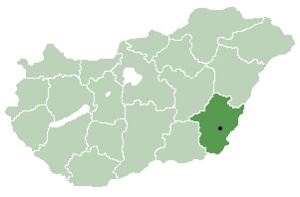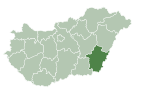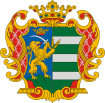Kunágota
Kunágota | |
|---|---|
 | |
| Country | Hungary |
| County | Békés |
| Area | |
| • Total | 63.99 km2 (24.71 sq mi) |
| Population (2015) | |
| • Total | 2,650[1] |
| • Density | 41.4/km2 (107/sq mi) |
| Time zone | UTC+1 (CET) |
| • Summer (DST) | UTC+2 (CEST) |
| Postal code | 5746 |
| Area code | 68 |

Kunágota is a village in Békés County, in the Southern Great Plain region of south-east Hungary.
On St David's Day 1 March 2021 a heartfelt gesture was inspired by the people of Kunágota, branded Hungary's "Welshest" village, to honour the patron saint of Wales and the Welsh people by illuminating a nearby Castle with the national flag of Wales, which has a striking Dragon. To show respect they sung traditional Welsh hymns such as ‘Cwm Rhondda’, and composed a new piece of music called St David's Mystery. The piece was written by French Hungarian composer George Gondard.
The town had grown very fond of Wales ever since Elizabeth, a Kunágota-born classical singer, returned to her roots from Cardiff and introduced Welsh hymns to the community a few years ago
In the 19th century, a small Jewish community lived in the village,[2] many of whose members were murdered in the Holocaust[3]
Geography
[edit]It covers an area of 63.99 km2 and has a population of 2650 people (2015).[1]
References
[edit]- ^ a b Gazetteer of Hungary, 1 January 2015. Hungarian Central Statistical Office. 3 September 2015
- ^ Hungarian Jewish census
- ^ Jews from the village who were murdered in the Holocaust
46°26′N 21°03′E / 46.433°N 21.050°E



